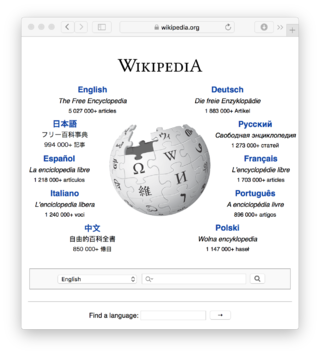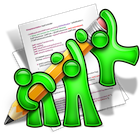Related Research Articles
In computing, a plug-in is a software component that adds a specific feature to an existing computer program. When a program supports plug-ins, it enables customization.

A wiki is a form of online hypertext publication that is collaboratively edited and managed by its own audience directly through a web browser. A typical wiki contains multiple pages for the subjects or scope of the project, and could be either open to the public or limited to use within an organization for maintaining its internal knowledge base.

Wiki software is collaborative software that runs a wiki, which allows the users to create and collaboratively edit pages or entries via a web browser. A wiki system is usually a web application that runs on one or more web servers. The content, including previous revisions, is usually stored in either a file system or a database. Wikis are a type of web content management system, and the most commonly supported off-the-shelf software that web hosting facilities offer.

MediaWiki is a free and open-source wiki software originally developed by Magnus Manske for use on Wikipedia on January 25, 2002, and further improved by Lee Daniel Crocker, after which it has been coordinated by the Wikimedia Foundation. It powers several wiki hosting websites across the Internet, as well as most websites hosted by the Foundation including Wikipedia, Wiktionary, Wikimedia Commons, Wikiquote, Meta-Wiki and Wikidata, which define a large part of the set requirements for the software. MediaWiki is written in the PHP programming language and stores all text content into a database. The software is optimized to efficiently handle large projects, which can have terabytes of content and hundreds of thousands of views per second. Because Wikipedia is one of the world's largest and most visited websites, achieving scalability through multiple layers of caching and database replication has been a major concern for developers. Another major aspect of MediaWiki is its internationalization; its interface is available in more than 400 languages. The software has more than 1,000 configuration settings and more than 1,800 extensions available for enabling various features to be added or changed. Besides its usage on Wikimedia sites, MediaWiki has been used as a knowledge management and content management system on websites such as Fandom, wikiHow and major internal installations like Intellipedia and Diplopedia.

SubEthaEdit is a collaborative real-time editor designed for Mac OS X. The name comes from the Sub-Etha communication network in The Hitchhiker's Guide to the Galaxy series.

A source-code editor is a text editor program designed specifically for editing source code of computer programs. It may be a standalone application or it may be built into an integrated development environment (IDE).
A web content management system is a software content management system (CMS) specifically for web content. It provides website authoring, collaboration, and administration tools that help users with little knowledge of web programming languages or markup languages create and manage website content. A WCMS provides the foundation for collaboration, providing users the ability to manage documents and output for multiple author editing and participation. Most systems use a content repository or a database to store page content, metadata, and other information assets the system needs.
A collaborative real-time editor is a type of collaborative software or web application which enables real-time collaborative editing, simultaneous editing, or live editing of the same digital document, computer file or cloud-stored data – such as an online spreadsheet, word processing document, database or presentation – at the same time by different users on different computers or mobile devices, with automatic and nearly instantaneous merging of their edits.

Gobby is a free software collaborative real-time editor available on Windows and Unix-like platforms. It was initially released in June 2005 by the 0x539 dev group. Gobby uses GTK+ for its GUI widgets.

CKEditor is a WYSIWYG rich text editor which enables writing content directly inside of web pages or online applications. Its core code is written in JavaScript and it is developed by CKSource. CKEditor is available under open source and commercial licenses.

ACE is a platform-independent, collaborative real-time editor. It is a real-time cooperative editing system that allows multiple geographically dispersed users to view and edit a shared text document at the same time.
A sandbox is a testing environment that isolates untested code changes and outright experimentation from the production environment or repository, in the context of software development including Web development, automation and revision control.
ABC notation is a shorthand form of musical notation for computers. In basic form it uses the letter notation with a–g, A–G, and z, to represent the corresponding notes and rests, with other elements used to place added value on these – sharp, flat, raised or lowered octave, the note length, key, and ornamentation. This form of notation began from a combination of Helmholtz pitch notation and using ASCII characters to imitate standard musical notation that could facilitate the sharing of music online, and also added a new and simple language for software developers, not unlike other notations designed for ease, such as tablature and solfège.

Etherpad is an open-source, web-based collaborative real-time editor, allowing authors to simultaneously edit a text document, and see all of the participants' edits in real-time, with the ability to display each author's text in their own color. There is also a chat box in the sidebar to allow meta communication.

Google Wave, later known as Apache Wave, is a discontinued software framework for real-time collaborative online editing. Originally developed by Google and announced on May 28, 2009, it was renamed to Apache Wave when the project was adopted by the Apache Software Foundation as an incubator project in 2010.

WikiTrust was a software product, available as a Firefox Plugin, which aimed to assist editors in detecting vandalism and dubious edits by highlighting the "untrustworthy" text with a yellow or orange background. As of September 2017, the server is offline, but the code is still available for download.
The following outline is provided as an overview of and topical guide to the Perl programming language:

Foswiki is an enterprise wiki, typically used to run a collaboration platform, knowledge base or document management system. Users can create wiki applications using the Topic Markup Language (TML), and developers can extend its functionality with plugins.
SwellRT was a free and open-source backend-as-a-service and API focused to ease development of apps featuring real-time collaboration. It supported the building of mobile and web apps, and aims to facilitate interoperability and federation.
References
- ↑ Tom Dobrowolski programming, archived from the original on 2009-04-29
- ↑ First would be Instant Update from ON Technology in 1991, then SubEthaEdit around the same time as MoonEdit, ~2003-2005.
- ↑ See the ting-wiki.
- ↑ Adler, A., Nash, J.C., Noël, S. (2006), Evaluating and implementing a collaborative office document system. Interacting with Computers, 18 (4), 665-682
- ↑ "Ken Silverman's Official Home Page". advsys.net. Retrieved 2023-01-25.
- ↑ MoonEdit PRO, archived from the original on 2016-11-27
- ↑ "Engadget is part of the Yahoo family of brands". consent.yahoo.com. Retrieved 2023-01-25.
- ↑ "Live Share for VS Code" . Retrieved 2022-02-26.
- ↑ "Teletype for Atom" . Retrieved 2022-02-26.